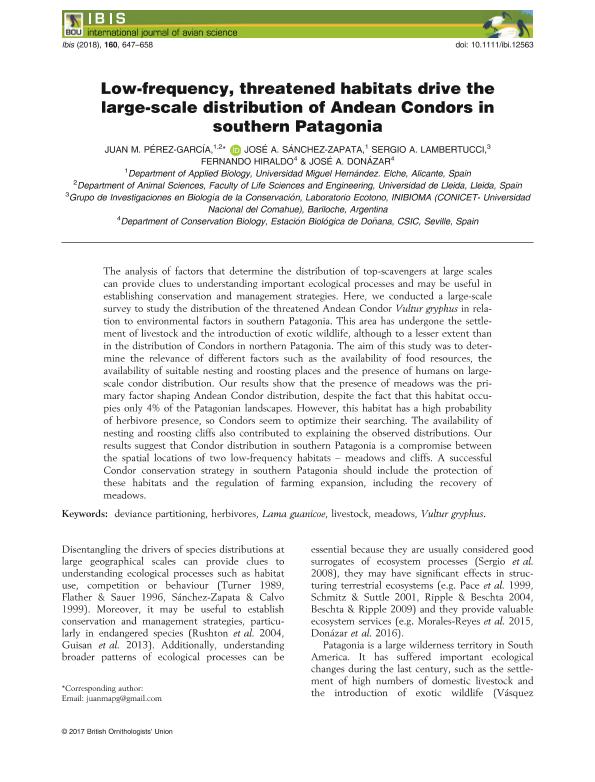Mostrar el registro sencillo del ítem
dc.contributor.author
Pérez García, Juan M.
dc.contributor.author
Sánchez Zapata, José A.
dc.contributor.author
Lambertucci, Sergio Agustin

dc.contributor.author
Hiraldo, Fernando

dc.contributor.author
Donázar, José A.
dc.date.available
2019-11-26T21:08:06Z
dc.date.issued
2018-07
dc.identifier.citation
Pérez García, Juan M.; Sánchez Zapata, José A.; Lambertucci, Sergio Agustin; Hiraldo, Fernando; Donázar, José A.; Low-frequency, threatened habitats drive the large-scale distribution of Andean Condors in southern Patagonia; Wiley Blackwell Publishing, Inc; Ibis; 160; 3; 7-2018; 647-658
dc.identifier.issn
0019-1019
dc.identifier.uri
http://hdl.handle.net/11336/90584
dc.description.abstract
The analysis of factors that determine the distribution of top-scavengers at large scales can provide clues to understanding important ecological processes and may be useful in establishing conservation and management strategies. Here, we conducted a large-scale survey to study the distribution of the threatened Andean Condor Vultur gryphus in relation to environmental factors in southern Patagonia. This area has undergone the settlement of livestock and the introduction of exotic wildlife, although to a lesser extent than in the distribution of Condors in northern Patagonia. The aim of this study was to determine the relevance of different factors such as the availability of food resources, the availability of suitable nesting and roosting places and the presence of humans on large-scale condor distribution. Our results show that the presence of meadows was the primary factor shaping Andean Condor distribution, despite the fact that this habitat occupies only 4% of the Patagonian landscapes. However, this habitat has a high probability of herbivore presence, so Condors seem to optimize their searching. The availability of nesting and roosting cliffs also contributed to explaining the observed distributions. Our results suggest that Condor distribution in southern Patagonia is a compromise between the spatial locations of two low-frequency habitats – meadows and cliffs. A successful Condor conservation strategy in southern Patagonia should include the protection of these habitats and the regulation of farming expansion, including the recovery of meadows.
dc.format
application/pdf
dc.language.iso
eng
dc.publisher
Wiley Blackwell Publishing, Inc

dc.rights
info:eu-repo/semantics/openAccess
dc.rights.uri
https://creativecommons.org/licenses/by-nc-sa/2.5/ar/
dc.subject
DEVIANCE PARTITIONING
dc.subject
HERBIVORES
dc.subject
LAMA GUANICOE
dc.subject
LIVESTOCK
dc.subject
MEADOWS
dc.subject
VULTUR GRYPHUS
dc.subject.classification
Conservación de la Biodiversidad

dc.subject.classification
Ciencias Biológicas

dc.subject.classification
CIENCIAS NATURALES Y EXACTAS

dc.title
Low-frequency, threatened habitats drive the large-scale distribution of Andean Condors in southern Patagonia
dc.type
info:eu-repo/semantics/article
dc.type
info:ar-repo/semantics/artículo
dc.type
info:eu-repo/semantics/publishedVersion
dc.date.updated
2019-10-10T13:54:36Z
dc.journal.volume
160
dc.journal.number
3
dc.journal.pagination
647-658
dc.journal.pais
Reino Unido

dc.journal.ciudad
Londres
dc.description.fil
Fil: Pérez García, Juan M.. Universidad de Miguel Hernández; España. Universidad de Lleida; España
dc.description.fil
Fil: Sánchez Zapata, José A.. Universidad de Miguel Hernández; España
dc.description.fil
Fil: Lambertucci, Sergio Agustin. Consejo Nacional de Investigaciones Científicas y Técnicas. Centro Científico Tecnológico Conicet - Patagonia Norte. Instituto de Investigaciones en Biodiversidad y Medioambiente. Universidad Nacional del Comahue. Centro Regional Universidad Bariloche. Instituto de Investigaciones en Biodiversidad y Medioambiente; Argentina
dc.description.fil
Fil: Hiraldo, Fernando. Consejo Superior de Investigaciones Científicas. Estación Biológica de Doñana; España
dc.description.fil
Fil: Donázar, José A.. Consejo Superior de Investigaciones Científicas. Estación Biológica de Doñana; España
dc.journal.title
Ibis

dc.relation.alternativeid
info:eu-repo/semantics/altIdentifier/url/https://onlinelibrary.wiley.com/doi/abs/10.1111/ibi.12563
dc.relation.alternativeid
info:eu-repo/semantics/altIdentifier/doi/http://dx.doi.org/10.1111/ibi.12563
Archivos asociados
